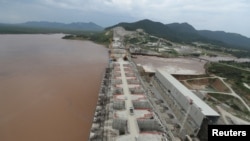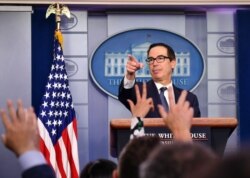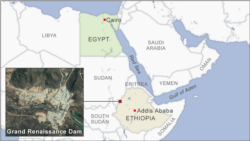The foreign ministers of Egypt, Ethiopia and Sudan met Wednesday in Washington with President Donald Trump and Treasury Secretary Steven Mnuchin to discuss the Grand Ethiopia Renaissance Dam (GERD) on Ethiopia's Blue Nile.
The massive hydropower dam project has been the focus of an escalating feud between Addis Ababa and Cairo over water resources.
The unannounced meeting was not on Trump's public schedule.
“The meeting went well and discussions will continue during the day!” the president tweeted on Wednesday.
After the White House meeting, the ministers continued discussions with Mnuchin and the President of the World Bank Group David Malpass.
In a joint statement issued by the U.S. Treasury after the meeting, the ministers—Sameh Hassan Shoukry of Egypt, Gedu Andargachew of Ethiopia and Asma Mohamed Abdalla of Sudan—noted the significance of the Nile to the development of the people of their countries, and "reaffirmed their joint commitment to reach a comprehensive, cooperative, adaptive, sustainable, and mutually beneficial agreement on the filling and operation" of the GERD.
The foreign ministers noted their agreement to hold four technical governmental meetings at the level of water ministers. The ministers agreed that the World Bank and the United States would support and attend the meetings as observers.
The meeting, spearheaded by Mnuchin, came about after Egyptian President Abdel-Fattah el-Sissi requested that Trump mediate the conflict over the dam.
Egypt has long-sought external mediation on the GERD, while Ethiopia wants to keep the negotiations on a tripartite level.
Countries at odds
All three countries are vitally important to U.S. interests, and the Trump administration’s efforts to facilitate the negotiations over the dam are not at all surprising, said Bronwyn Bruton, director of programs and studies at the Africa Center of the Atlantic Council.
"Any armed or proxy conflict between these nations over the GERD would have a profoundly destabilizing effect on a region that is already facing ethnic unrest, political transition, and a rising threat from jihadi extremist groups," Bruton said.
The ministers committed Wednesday to work toward completion of an agreement by Jan. 15, 2020.
"This is a positive step forward," said Aaron Salzberg, director of the Water Institute at the University of North Carolina. Salzberg is the State Department's former special coordinator for water in the Bureau of Oceans and International Environmental and Scientific Affairs at the State Department, which deals with international transboundary water issues.
"The Administration deserves credit for getting the countries back to the table and getting these conversations back on track," Salzberg said.
In an Oct. 5 statement, the Ethiopian government condemned Egypt's proposal for Nile water allocation, calling Egypt's conditions for filling the massive reservoir of the GERD "unjustified" and disruptive to "the positive spirit of cooperation."
Egypt and Ethiopia have disagreed for years about how to divert water from the Nile. Addis Ababa is proposing the reservoir behind the dam be filled over four to seven years. But Egypt wants to require Ethiopia to receive approval at various points of the filling process, a step Cairo said is necessary to avoid droughts.
"It's possible that nothing changes,” said Salzberg. “It is also possible that those governments start to realize that this is a region that matters to the rest of the international community, and their approach to solving this problem could affect how partners work with them in the future.”
Sudan has a 1959 Nile Waters Agreement with Egypt, reached shortly before Egypt began constructing its own Aswan High Dam, but Ethiopia was not part of that agreement.
Salem Solomon contributed to this report.






